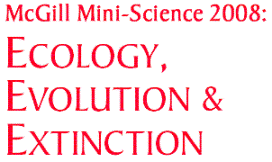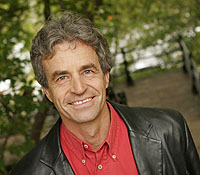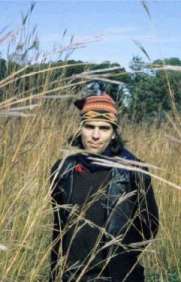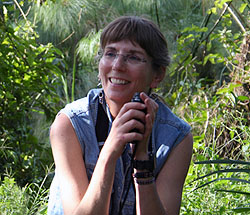

Here are short biographies for this year's Mini-Science lecturers:
- Prof. Brian Alters
- Prof. Graham Bell
- Prof. Garry Peterson
- Prof. Lauren Chapman
- Prof. Colin Chapman
- Prof. Andrew Gonzalez
- Prof. Michel Loreau
Prof. Brian Alters
Evolving from Microbes to Mankind: The Science and the Controversy
[Overview]
March 26, 2008
Dr. Alters is a global leader in the field of evolution education and author of the best-selling Defending Evolution in the Classroom. In 2005, he was recruited as the only Expert Witness from Canada in the largest, most important, most publicized United States federal trial in over a quarter century on biological evolution, education and the U.S. Constitution. His testimony made headlines around the globe and contributed to a ruling that deemed the teaching of intelligent design in high school science classes unconstitutional.
Dr. Alters is the Tomlinson Chair in Science Education; Director, Tomlinson Project in University-Level Science Education (T-PULSE); Director, Evolution Education Research Centre; Sir William Dawson Scholar; winner of the Principal's Prize for Excellence in Teaching; and has held an appointment in the Harvard College Observatory at Harvard University for the past 10 years.
Prof. Graham Bell
Adaptation, Extinction and Global Change
[Overview]
April 2, 2008
Prof. Graham Bell is an evolutionary biologist and Founding President of the Canadian Society for Ecology and Evolution. He has garnered numerous awards including the Prix Léo Parizeau de l'Association francophone pour le savoir, and the Prix Marie-Victorin (Prix du Québec). He was the Director of the Redpath Museum, McGill University from 1995-2005, and is an Honorary Fellow of St Peter's College, Oxford.
Prof. Bell's research areas include experimental evolution, adaptation and adaptive radiation, community ecology and biodiversity, and life cycles and sex. He has published the results of research in numerous journals such as Nature, Science, Proceedings of the Royal Society of London, and Proceedings of the National Academy of the U.S.A. He is the author of The Masterpiece of Nature (1982), Sex and Death in Protozoa: the History of an Obsession (1989) and Selection: The Mechanism of Evolution (1996).
Prof. Garry Peterson
Ecology and Human Well-Being
[Overview]
April 9, 2008
Prof. Peterson conducts interdisciplinary research on the resilience of social-ecological systems. He is interested in the ecological dynamics of human dominated ecosystems, and understanding the dynamics of social-ecological systems. His research is contributing to the development of interdisciplinary and collaborative environmental research at McGill University.
Prof. Peterson is Canada Research Chair in Social-Ecological Modelling and assistant professor jointly appointed in the Department of Geography and the McGill School of the Environment at McGill University. He is a member of the Resilience Alliance and a coordinating lead author for the Millennium Ecosystem Assessment. He is also the book review editor for Ecology and Society and maintains a weblog on Resilience Science.
Prof. Lauren Chapman
Biodiversity Lost and Found: Lessons of the Lake Victoria Basin
[Overview]
April 16, 2008
Prof. Lauren Chapman is a professor of Biology and holds a Canada Research Chair in Respiratory Ecology and Aquatic Conservation. She has also served as an honourary lecturer at Makerere University of Uganda since 1990, and an associate scientist with the Wildlife Conservation Society since 1995. Her major research themes are aquatic ecology and conservation; she is particularly interested in problems of environmental stressors on aquatic organisms and adaptations of fishes to extreme environments.
Over the past 17 years, Prof. Chapman has conducted research in East Africa -- on the rivers, wetlands, and lakes of western Uganda and the Lake Victoria basin. Her recent work focuses on the consequences of low-oxygen stress for fishes, the interaction of low oxygen with other environmental stressors (e.g., introduced species), and value of tropical wetlands in the maintenance of fish biodiversity. Her program is strongly embedded in international research and training that has been fostered by strong linkages with the National Fisheries Resources Research Institute and Makerere University of Uganda.
Prof. Colin Chapman
Primates in Peril: What can be done?
[Overview]
April 23, 2008
Dr. Colin Chapman received his joint Ph.D. in the Departments of Anthropology and Zoology at the University of Alberta. He spent 2 years at McGill and 3 years at Harvard University doing post-doctoral research. Since 1990 he has served as an Honourary lecturer in the Department of Zoology at Makerere University Uganda; and, since 1995, he has been an associate scientist with the Wildlife Conservation Society. Colin also served as a faculty member in Zoology at the University of Florida for 11 years, and returned to McGill in 2004 to take up a professorship in the Department of Anthropology and McGill School of Environment, where he holds a Canada Research Chair position in Primate Ecology and Conservation.
For the last 17 years, Colin Chapman has conducted research in Kibale National Park, Uganda. In general, his research focuses on how the environment influences primate abundance and social organization and how primates affect their environment through seed dispersal and herbivory. Given the plight of primates around the world, he applies this information to find novel solutions to the conservation of this unique group of animals.
Prof. Andrew Gonzalez
The Future of Biodiversity: Science and Solutions
[Overview]
April 30, 2008
Andrew Gonzalez obtained his PhD in Biology in 1998 from Imperial College, London. He then spent six months as a postdoctoral researcher at the University of Paris VI "Pierre et Marie Curie" before accepting an assistant professor position there. In September 2003 he moved to McGill University. He is currently an Associate Professor and Canada Research Chair in Biodiversity in the Department of Biology.
His research is broadly focused on the causes and consequences of biodiversity loss. From an applied point of view his research is aimed applying science to mitigate the causes of extinction. His lab conducts experiments in the field and the laboratory, and uses theory and databases to tackle various research projects related to the problem of biodiversity loss: The impacts of habitat fragmentation, species persistence in changing and variable environments, and the impacts of economy on biodiversity.

Prof. Michel Loreau
The Ecological Consequences of Biodiversity Loss
[Overview]
May 7, 2008
Michel Loreau is Full Professor and Tier 1 Canada Research Chair in theoretical ecology at McGill University (Montreal, Canada). After receiving his Ph.D. from the Free University of Brussels (Belgium), he was research assistant of the National Fund for Scientific Research (Belgium), lecturer at the Free University of Brussels, programme manager at the Science Policy Office (Belgium), and professor at Pierre and Marie Curie University (Paris, France).
Michel Loreau is renowned internationally for his work on biodiversity and ecosystem functioning, but his scientific interests cover a wide range of theoretical topics at the interface between ecosystem ecology, community ecology, and evolutionary ecology. He has won several scientific prizes, including the International Ecology Institute Prize, the Silver Medal of the National Centre for Scientific Research (France), and the Agathon De Potter and Max Poll Prizes of the Royal Academy of Belgium. He has been member of numerous national and international scientific committees. In particular, he currently chairs the Scientific Committee of DIVERSITAS, the international programme of biodiversity science, and the International Steering Committee of the consultative process towards an International Mechanism of Scientific Expertise on Biodiversity.





